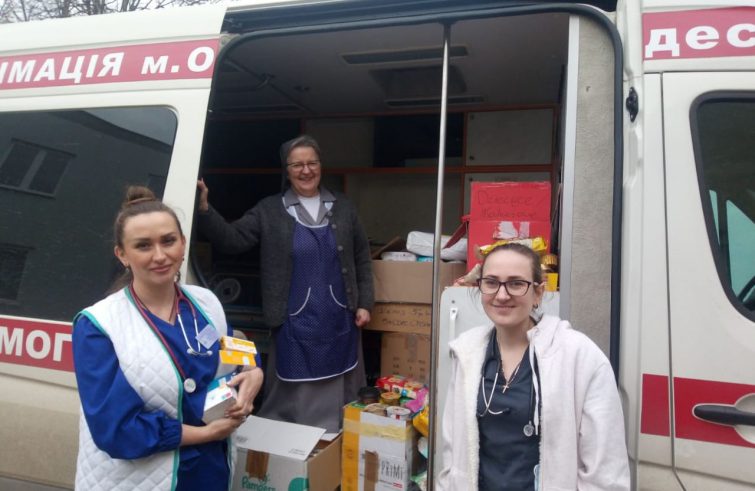
Increasing numbers of Ukrainian refugees are seeking a sanctuary in other European countries – almost three million to date according to the UN. Sr Jolanta of the Salesian Sisters of Don Bosco operating in Eastern Europe, in Lviv for the past 25 years, told SIR that tens of thousands of people arrive every day in the city located less than 100 kilometres from the Polish border.
The Sisters do their best to arrange transportation to Poland for them, they distribute humanitarian aids, prepare for the dispatch of basic necessities and medicines to the inland areas of Ukraine.They cook and offer warm meals to the needy after exhausting week-long displacements from Sumy, Kharkiv or Mariupol.
They are working non-stop.
Their latest undertaking was last Saturday. It was not easy for the nun to arrange the journey to Poland of two mothers with their babies. The first stop was the Lviv railway station in search of a bus to Poland. Unfortunately all the seats were booked, so the Sisters had to find an alternative solution. The journey is complex and dangerous. Snow and frost at the border crossings with Poland drop temperatures well below zero and passengers sometimes have to wait more than 20 hours. It is out of the question for two mothers and their babies to be left waiting in such conditions.
Having made several phone calls, the nun was able to find a driver willing to take the two women and their children in his van, which had arrived in Ukraine loaded with humanitarian aid, and drive them to Poland. Awaiting them at the border were several villagers from a small town in central Poland.
“The cruelty and violence of these last few weeks has generated a sea of goodness”,
says Sister Jolanta, firmly convinced that
“Goodness will win in spite of everything.”
Jolanta is one of 28 women religious from the Salesian Province based in Wroclaw, south-eastern Poland, serving in Ukraine, Belarus, Russia and Georgia.
The Mother Superior, Sr Malgorzata, has just arrived in Wroclaw from Belarus “where – she tells us – many young men and fathers fear compulsory military recruitment for a cause that to them seems unjust.” She observes that “a large part of Belarusian society disagrees with government decisions but dares not oppose the leadership for fear of harsh penalties, including several years in prison for disobedience.”
Not all the refugees arriving into Poland from Ukraine have someone to turn to for help, a contact person, or family members ready to take them in, the nuns say.
“In most cases, they take the first train they find, as long as it takes them far away from the war”, continues Sr Malgorzata, pointing out that these people are even more in need than others because “they arrive in Wroclaw exhausted, they don’t speak Polish and have no points of reference. That is why we go to the railway station several times a day to try to identify those needing help”, she continues.
Several mothers with children have found a safe haven at the Home of the Salesian nuns in Wroclaw, where linens have been cut to make bandages for the wounded in the battlefront since the beginning of the Russian invasion, and camouflage nets are made to conceal the Ukrainian soldiers’ positions.
A group of forty or so have been accommodated at the Sisters’ house in Pieszyce, where one of the Ukrainian-born Sisters is teaching them Polish, helping them to process bureaucratic paperwork, find a job and, if possible, a permanent home.
“Some of those mothers with children will return to Ukraine after the end of the war, but many will have no place to return to, no home and no longer the life they had before. These women will have to start over from scratch,” says Sr Malgorzata, with bitterness but without resignation.
The Sister of Don Bosco are also present in Moscow and “now their mission is to bring peace to the people, to be close to them and to offer them help”, she adds.
“Many people in Russia are strongly against the invasion of Ukraine”, says Sister Teresa from Odessa. Over these past days she has been working together with two other Sisters in the distribution of humanitarian aid delivered from the West of the country by some courageous priests and lay people who, like many men and women, are not afraid to confront the shelling and missiles of the Russian army. “Medicines have arrived for the neonatology ward,” she says to explain why she is also working on Sundays.
According to the nun, local sources report that Odessa was spared the bombs and destruction because it is supposed to become the capital of a “New Ukraine ” under Putin’s leadership.
“Maybe – she adds – because the majority of the population of Odessa is pro-Russian, but only because the Ukrainians have fled. Moreover, it also appears that some Orthodox priests are encouraging the inhabitants to welcome, with enthusiasm, the Russian army that has come to liberate the city.”
The whole of Ukraine is present in the constant prayers of the nuns, starting with Kyiv and its inhabitants facing the threat of imminent bombing. And also Irpin, one of the city suburbs with 3 million residents. The Salesians inaugurated a school in the Ukrainian capital Kyiv in September to help young people obtain a diploma. The project is currently on hold, but this does not motivate Sister Irena to leave her beloved Ukraine. “I have decided to stay here to help people”, she says, heartened in her intention by the daily Adoration, in spite of the bombings that have continued in Lviv as before in Kiev.
“The wall of prayer,” she says with conviction, “is as effective against evil as the soldiers’ resistance at the battlefront.”









